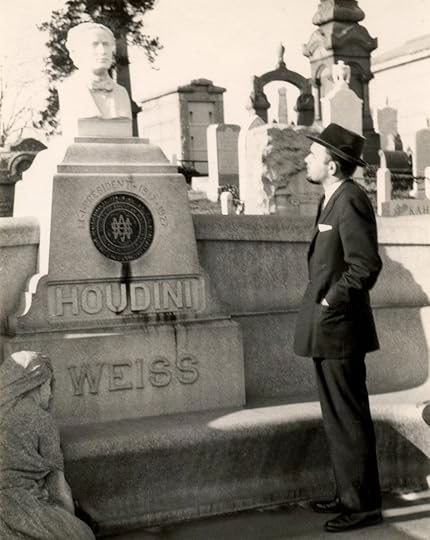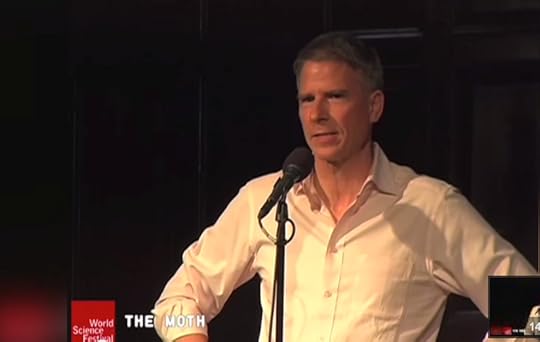Hemant Mehta's Blog, page 1880
November 10, 2014
Sean Faircloth, Former Head of the Secular Coalition for America, Wins Seat on Bangor (Maine) City Council
At one point, before he became the Executive Director of the Secular Coalition for America in 2009 (a position he held for two years), Sean Faircloth (below) was a state legislator from Maine, serving five terms in the House (1992-1994; 2002-2008) and Senate (1994-1996).
In the years after leaving the SCA, he worked as Director of Strategy and Policy for the Richard Dawkins Foundation for Reason and Science, where he was frequently the “opening act” for Dawkins’ lectures, and wrote a book called Attack of the Theocrats: How the Religious Right Harms Us All — and What We Can Do about It.
Last week, he stepped back into the political world, earning a seat on the nine-member Bangor City Council. He was one of five candidates vying for three open seats and came in third:
The top vote getter in this year’s council race was Ben Sprague, the current council chairman, who received 7,092 votes. He was closely followed by Joe Baldacci, also an incumbent candidate, who had 7,063 votes.
Winning the third position was Sean Faircloth, with 5,234 votes, according to unofficial election results released late Tuesday night.
In a conversation with the Bangor Daily News, Faircloth talked about how he was excited to get back into local politics:
“I was very pleased to be elected alongside two very strong incumbents,” Faircloth said during an interview Friday.
…
Faircloth said he hopes his experience in the Legislature will allow him to help the council connect with lawmakers and ensure Bangor’s voice is heard, even though the state’s own fiscal challenges mean nothing is guaranteed.
“I’m certainly going to throw myself into it,” he said.
At least we won’t have to worry about secular invocations being a problem in Bangor.
Best of luck to Faircloth in his new role; it’s good to have another out Agnostic in American politics, no matter the level.
(Image via Wikipedia)
All Around Us, Placebo Buttons and “Deceptive Technology” Prove That We’re Not So Different From Pavlov’s Dog
Have you ever danced to make it rain? Worn garlic around your neck to stave off vampires? Sacrificed a virgin to persuade the sun to come up?
I’d venture that you never did any such thing. But if you’re anything like me, when you’re a pedestrian in a city, you do press the crosswalk button to make the light turn green, which it eventually does. Every time that happens, you and I and almost everyone else are being conditioned, Pavlov‘s-dog-style, to do it again the next time we cross the street.
Now consider this: there’s a high likelihood — probably something like 8 or 9 out of 10 — that the button, by design, either never worked to begin with, or has been disabled in recent years thanks to fully-automated traffic control systems taking over.
The same is true for the “close the doors” button on today’s elevators. In most cases, these buttons do absolutely nothing but give us an illusion of control. They were put there to prevent or lessen user frustration. When the doors eventually do close, which is always, our brains receive a happy jolt of confirmation that our action was successful. That’s all the reward we need to keep pressing those almost certainly non-functional buttons in the future.
The deceit is everywhere, writes author David McRaney. It includes dummy office thermostats, not actually wired up, that lull workers into a false sense of agency over their shared environment (install such a dummy, and complaints about the office being too hot or too cold drop markedly).
Three researchers – Eytan Adar, a computer scientist at the University of Michigan, and Desney Tan and Jaime Teevan, scholars at Microsoft Research – have collected and described hundreds of examples of deceptive technology. Some are subtle. For instance:
[W]hen the servers at Netflix fail or are overwhelmed, the service switches from its personalized recommendation system to a simpler one that just suggests popular movies [to everyone, regardless of individual customers' movie preferences].
I’ve noticed recently that Apple’s ship times for the new iPhone 6 and 6-Plus appear to be deliberately exaggerated. Most of the devices ship well before the dates indicated on the website when you check your order status, the better to ultimately impress customers. That’s a time-honored trick, akin to the
How Great Is Allah the Merciful, the Compassionate?
This great:
A suicide bomber disguised in a school uniform detonated explosives at a high school assembly in the northeastern Nigerian city of Potiskum on Monday, killing at least 48 students, according to survivors and a morgue attendant.
The victims were as young as eleven.
Soldiers rushed to the scene, grisly with body parts, in the capital of Yobe state, but they were chased away by a crowd throwing stones and shouting that they are angry at the military’s inability to halt a 5-year-old Islamic insurgency that has killed thousands and driven hundreds of thousands from their homes.
At the hospitals where the survivors were treated,
… 79 students were admitted and health workers said they [have] serious injuries that may require amputations. The hospital was so overcrowded that some patients were squashed two to a bed.
In allowing the carnage, God is certainly consistent.
A suicide bomb attack in the same city killed 30 people one week ago, when suspected Boko Haram fighters attacked a religious procession of moderate Muslims.
Boko Haram — the name means “Education is sinful” — loves targeting schools and students (such as the 200-plus girls it abducted half a year ago). Last year, also in Yobe, and continuing a long string of atrocities, the group attacked a school and killed 29 pupils and a teacher. Some were burned alive.
A New Book Documents Hate Mail Sent by Christians to Military-Focused Church/State Separation Group
If you live in Los Angeles, keep an eye out for this mobile billboard around town beginning today:
That provocative billboard is part of an advertising campaign for a forthcoming book by Bonnie Weinstein, co-founder of the Military Religious Freedom Foundation, called To the Far Right Christian Hater… You Can Be a Good Speller or a Hater, But You Can’t Be Both (Rare Bird Books, 2014). (The generous subtitle is: Official Hate Mail, Threats, and Criticism from the Archives of the Six-Time Nobel Peace Prize-Nominated Military Religious Freedom Foundation.)
It’s a compilation of hate mail that has been directed at the group and the author’s husband Mikey Weinstein over the years.
In the excerpt below, Bonnie documents the kinds of letters MRFF receives and how they affect her personally:
My name is Bonnie Weinstein, and I am married to a force of nature.
About forty years ago now, when I was sixteen, my decision to go up to the United States Air Force Academy to meet “real men” set me on a collision course with my future — one that I would never trade away, even though it so often leaves me shaking my head with disbelief and astonishment at the absolute shock of it all.
Kierkegaard has a saying: “Life can only be understood backwards; but it must be lived forwards.” While I admit that I tend to understand myself better the more I move forward in life, I have found that I understand nobody better — both forward and backward — than my darling husband. It saddens me, however, to know that, without a doubt, there is no amount of living through this maelstrom of hate and viciousness — all in the name of a benevolent God — that will ever let me come to understand the men and women who write the hideous letters presented here. This book is but a TINY sampling of the thousands we have received, with more coming in on a daily basis. I have chosen to publish this body of gutter-level trash to try and shed some light on the people they affect — myself and those closest to me.
In 2005, my husband and I started the Military Religious Freedom Foundation (MRFF), and in the ensuing decade it has taken an extreme amount of intestinal fortitude to stay the course. We fight against those who, at worst, seem hell-bent on dismantling our Constitution, and at best, seem to have little idea of what they are talking about. These authors, and I use that term very loosely, seem to have never made it past a third grade intelligence level both in erudition and education. Simple people skills, which kids learn in kindergarten — such as learning to play well, getting along with people, and understanding that not everyone thinks the same way you do — have sadly eluded them altogether.
12 Things You Didn’t Know About the Amazing James Randi
The New York Times Magazine profiled 86-year-old super-skeptic James Randi yesterday. It’s a good read. Here are a dozen things I learned.
1. Randi started his career working Toronto nightclubs as Randall Zwinge (his real name), an entertainer who could predict the future. Soon, he began planning a very neat if somewhat morbid trick.
Each night before he went to bed, he wrote the date on the back of a business card along with the words “I, Randall Zwinge, will die today.” Then he signed it and placed it in his wallet. That way, if he were knocked down in the street or killed by a freak accident, whoever went through his effects would discover the most shocking prophecy he ever made. Zwinge kept at it for years. Each night, he tore up one card and wrote out a new one for the next day. But nothing fatal befell him; in the end, having wasted hundreds of business cards, he gave up in frustration. “I never got lucky,” he told me.
Randi visits Harry Houdini’s grave
2. Randi has a collection of some 4,000 books about magic, hoaxes, mysticism, and the like,
… arranged alphabetically by subject, from alchemy, astrology, Atlantis and the Bermuda Triangle to tarot, UFO’s and witchcraft.
3. He doesn’t take kindly to being called a debunker; “scientific investigator” will do just fine, thanks very much. The difference means a lot to him:
“If I were to start out saying, ‘This is not true, and I’m going to prove it’s not true,’ that means I’ve made up my mind in advance. So every project that comes to my attention, I say, ‘I just don’t know what I’m going to find out.’ That may end up — and usually it does end up — as a complete debunking. But I don’t set out to debunk it.”
4. When he was an illusionist, people would refuse to believe he didn’t really possess supernatural powers, no matter how many times he told them the truth.
In 1949 he made local headlines for a trick in which he appeared to predict the outcome of the World Series a week before it happened, writing the result down, sealing it an envelope and giving it to a lawyer who opened and read it to the press after the series concluded. But no matter how many times he assured his audiences that such stunts were a result of subterfuge and legerdemain, he found there were always believers. They came up to him in the street and asked him for stock tips; when he insisted that he was just a magician, they nodded — but winked and whispered that they knew he was truly psychic.
Fox News Guest: Jason Heap, the Humanist Suing the Military, Just Wants to Bring Down the Chaplaincy
A few days ago, Jason Heap filed a federal lawsuit against the U.S. Navy and the Department of Defense for rejecting his application despite his stellar credentials.
Fox News chatted about the lawsuit yesterday morning — and who better to bring in to discuss it than Jason Heap Father Jonathan Morris, the conservative Catholic who opposes church/state separation?
His main argument boils down to semantics. The word “chaplain” is religious in origin, so that should be the end of discussion. Screw all those atheists in the military who want counseling from someone who understands where they’re coming from!
Interestingly enough, Morris later explains that atheists are free to get together and discuss their beliefs just like they do at Columbia University, where he serves as a Religious Life Adviser. Indeed, he says, he has an atheist colleague who leads those discussions. Why can’t atheists in the military just do that?!
What he neglects to mention is that the atheist colleague he’s talking about, Dr. Anne Klaeysen, served as a Humanist Chaplain at Adelphi University before coming to Columbia. And the American Humanist Association, even today, refers to Klaeysen as a Humanist Chaplain at Columbia.
So the terminology issue is just idiotic.
Not to mention there are privileges in the military that come with being a chaplain in name, the least of which is that conversations you have remain confidential. Soldiers don’t get that privacy with a counselor who may have a different title.
Then, Morris went full conspiratorial.
He claimed that, because Heap was suing the military, he’s really just trying to bring down the chaplaincy:
I don’t know [Heap's] intention, but based on the fact that he’s suing now, the military, he’s obviously saying, you know, “I don’t like this whole chaplaincy thing at all. I don’t think our government should be supporting anybody who is promoting religion”… Don’t try to get rid of something that is good just because you don’t happen to like it!
Of course, that’s a complete straw man. Heap wants to become a chaplain because he respects the chaplaincy. It’s not illegal for the government to have chaplains who serve people of all religious beliefs (and none, too). And that’s the problem: Right now, the chaplains only serve religious soldiers (and not even all of them), and atheists are left to fend for themselves.
November 9, 2014
Happy Sagan Day!
Carl Sagan was born 80 years ago today. Although we’re still mourning his passing, he left a legacy of curiosity and optimism worthy of celebration.
You can find this image and many others like it on the Friendly Atheist Facebook page!
PSA: Beware Monster Energy Drinks, As They Are the Work of the Devil
Playing vinyl records backwards can be thirsty work. That’s why Satan created Monster (pronounced Maanster) drinks, named after his own evil self, and clearly festooned with the number 666 in Hebrew.
This Christian lady explains:
(via Dangerous Minds)
The Dying of DNA Pioneer Francis Crick: Dealing With Death When You Don’t Believe in an Afterlife
Ten summers ago, Francis Crick, the famed molecular biologist and neuroscientist who won a Nobel Prize for co-discovering the structure of DNA, died after a years-long battle with colon cancer. One of his closest friends and collaborators, Kristof Koch, remembers Crick’s demise — and especially his unflappability in the face of death – in this funny and moving 16-minute presentation, recorded before an appreciative audience at the World Science Festival.
We feature it here because, unlike Koch, who remained a practicing Catholic (more on that later), Crick didn’t believe in an afterlife. In fact, he was often profoundly irritated by religion, especially Christianity:
“I do not respect Christian beliefs. I think they are ridiculous. If we could get rid of them we could more easily get down to the serious problem of trying to find out what the world is all about.”
Crick was serious about his antipathies: at age 42, he accepted an honorary fellowship at Churchill College in Cambridge, England, only to resign it when the administrators announced they would build a chapel on the premises. Recounts Koch:
Francis felt that a new college dedicated to science, mathematics and engineering was no place for superstition. Winston Churchill, in whose name the college had been founded after the war, tried to appease Francis, and wrote him a letter pointing out that the financial means for the construction of the chapel would be raised entirely by private means, it would be open to people of any faith, and that nobody would be forced to attend. Francis replied by return post, proposing the construction of a brothel. The construction of the bordello would be financed entirely by private means, it would be open to all men no matter what their religious conviction, and no man would be forced to attend. And he actually included a check for a down payment. This ended the correspondence between the two great men.
But Crick was no doctrinarian blowhard, never forcing Koch into an uneasy conversation about why the latter believed in God (though Koch long dreaded the moment that never came, fearing he would be out-argued by his older friend, who had become a father figure to him).
And then, gradually, Koch found that he didn’t believe in the Christian teachings anymore. In his stage presentation, he says:
The God I now believe in is much closer to Spinoza’s God than the God of Michelangelo’s painting or the God of the Old Testament. I’m sort of saddened by the loss of my belief in religion. It’s like leaving forever the comfort of your childhood home, suffused with warm glows and fond memories. But I do believe we all have to grow up. It’s difficult for many, it’s unbearable to the few, but we have to see the world as it really is, and we have to stop thinking in terms of magic. As Francis would have put it, “This is a story for grown men, not a consoling tale for children.“
A Grief Workbook for Atheists Dealing with Death
After Carol Fiore‘s husband died, she, like so many atheists who have lost a loved one, struggled to deal with the grief because all the resources out there were aimed at religious people.
Now, she’s written A Grief Workbook for Skeptics: Surviving Loss without Religion, a helpful guide for atheists going through the toughest of times, so they don’t feel so isolated.
In the excerpt below, reprinted with permission from the author, Fiore talks about how to respond to words of “consolation” that are really not helpful at all:
Do any of these statements sound familiar?
God doesn’t make mistakes.You won’t get better unless you accept the Lord Jesus Christ into your life.God has a plan.I’m praying for you.Your loved one is in a better place.God is testing you.There is a reason and a purpose for everything.It’s God’s will.Come to my church and pray with me.God loves the person you lost.God is a kind, just, and caring being.Your loved one is happier.Have faith.Put your life in God’s hands.It could be worse.God never gives us more than we can handle.There are three main responses to people who say these sorts of things to you: ignore them, fight back, or thank them. What should you do?
I can’t answer that question for you because there is no right or wrong answer, but I can tell you what I did. At first, I thanked people because I was in shock, I knew they meant well, and I was trying to be agreeable. As time went by, I became angry about the comments and fought back. I recall snapping at someone, “Why would a loving God force children to watch their father suffer and die?” Eventually I lost the energy to argue with people.
Here are a few possible scenarios. These are some of my actual responses and, admittedly, may not have been the most appropriate. I went through phases, giving different responses based on different people and different circumstances, sometimes going back and forth between anger and acceptance, between tolerance and intolerance. I hid in the atheist closet for most of my life, only coming out when Eric was in the hospital and, even then, not to everyone. Your friends, perhaps even your family, may not know you’re a nonbeliever. If you prefer to keep it that way, but don’t want to lie or pretend, try the first approach below.
The I-don’t-want-to-argue reply
Religious Person (RP): God has a plan.
Me: Thanks. Please excuse me.
The angry reply
RP: Your husband is in a better place.
Me: A hole in the ground is not a better place.
The nice-but-assertive reply
RP: Things happen for a reason.
Me: I appreciate your concern, but I don’t believe that.
The taking-charge reply
RP: Your husband is with the Lord Jesus.
Me: I respect that you’re religious, but I don’t believe in an afterlife.
The gentle I’m-an-atheist reply
RP: I’m praying for you.
Me: That’s kind, and you’ve been a great friend. I hope we continue to be friends, but I feel I should be honest. I’m an atheist.
The harsh I’m-an-atheist reply
RP: God never does anything without a reason.
Me: I’m an atheist.
The I’m-not-internalizing-your-comment reply
RP: God never gives us more than we can handle.
Me: Okay.
The advice-to-religious-people reply
RP: Your husband is in heaven and you’ll see him again.
Me: I respect your religion, but I’m not a believer. I know you’re trying to help me feel better and I appreciate that, but you need only say you’re sorry.
The somewhat-rude-and-dismissive reply
RP: Things could be worse.
Me: Sure. Whatever.
This next bit of advice is for people trying to help someone through a loss. It’s difficult to know what to say to a friend in emotional pain. Many of us stumble over our words and say the wrong things. We want to help ease the pain, but we know we can’t, so we ramble on and on. Sometimes we say inappropriate things. What everyone, religious or nonreligious, needs to say to someone suffering through grief is simple: “I’m sorry.” Don’t talk about a plan and a better place. Ask what your friend needs. Maybe it’s rides for the kids, meals, or errands. The most comforting thing anyone ever said to me was, “My life was better because I knew your husband.”
I should mention that we have some Atheist Voice videos coming up dealing with this exact topic and they will be posted soon.
A Grief Workbook for Skeptics: Surviving Loss without Religion is now available on Amazon.
Hemant Mehta's Blog
- Hemant Mehta's profile
- 38 followers













